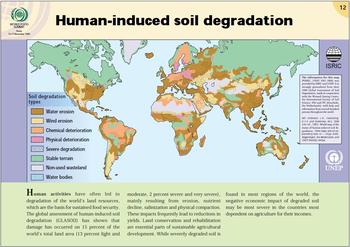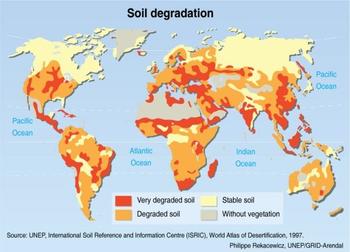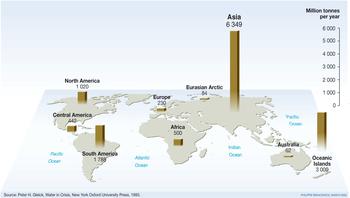Soil degradation
Soil degradation is a global process, yet it has most severe effects on arid and semi-arid zones, in particular in sub-Saharan Africa. Soil degradation is increasing worldwide. The depletion of nutrients and soil organic matter as well as erosion are the principal forms of soil degradation. Soil degradation can be defined as a process in which one or more of the potential ecological functions of the soil are harmed. This process lowers the current and/or future capacity of the soil to produce goods and services. Soil degradation can be a result either of natural hazards or due to unsuitable land use and inappropriate land management practices. Soil degradation can be classified into four different types: water erosion, wind erosion, chemical (salinization, acidification, soil pollution and fertility decline) and physical deterioration (soil crusting, sealing and compaction). (Keller 2012)
Outlook
Cultivating and managing soils in a more sustainable way would reduce environmental pressures all over the world: When crops are harvested, organic material and nutrients are removed from the fields (nutrient cycle). While artificial fertilizers replace - to some extent - the loss of nutrients, they do not replace the loss of organic material. Over time, this seriously reduces soil quality, leading to soils with a lower water holding capacity, less air and soils that are more susceptible to erosion and hence also degradation.
Soils are the basis for the production of food. The area of arable land is limited. Given the world’s growing population and the area of soils that are already degraded, sustainable land management is crucial. Sanitation practices that reuse nutrients and organic matter present in wastewater and excreta could contribute largely to sustainable soil management, as they are not only able to balance nutrient losses, but also replenish organic substances that are lost through harvesting.
(Keller 2012)


